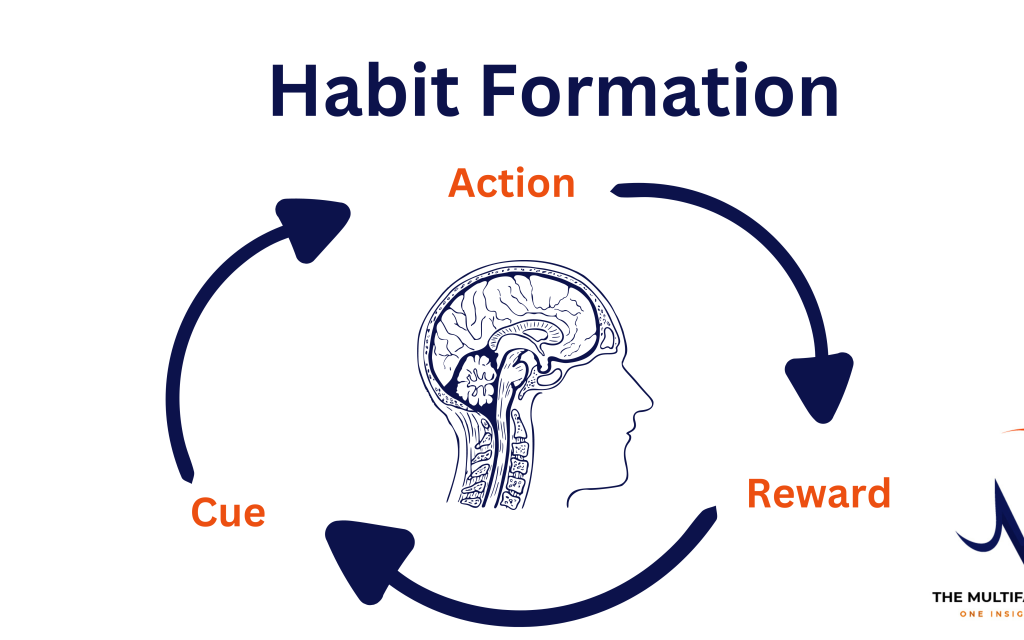
Habit Formation

Have you ever mindlessly reached for a second slice of pizza, scrolled through social media for an hour “just to check something,” or hit the snooze button five times in a row? We all have them – those ingrained habits that can sometimes feel beyond our control. But what if we told you there’s a science behind these habits, and even better, a way to harness that science to create positive change?
This guide dives deep into the fascinating world of habit formation. We’ll explore the psychology behind why habits stick, unpack the secrets of creating positive routines, and equip you with strategies to break bad habits and finally conquer that “one more episode” syndrome.
Think of your habits as well-worn paths in your brain. Each habit follows a loop consisting of three key elements:
The key to understanding habit formation lies in that final stage – the reward. When your brain associates a certain behavior with a positive outcome, it strengthens the neural connections involved, making the habit more likely to be repeated in the future.
So, how do we utilize the science of habit formation to create positive changes? Here are some key strategies:
Breaking bad habits requires disrupting the existing loop and establishing a new one. Here are some tactics to help you on your journey:
Remember, creating new habits and breaking old ones takes time and dedication. Don’t get discouraged by setbacks; they’re a natural part of the process. The key is to be persistent, celebrate your successes along the way, and keep your focus on the positive changes you’re striving to achieve.
With a deeper understanding of the science behind habits and the strategies outlined above, you can
unlock the power of habit formation to transform your life. Imagine waking up feeling refreshed, tackling your to-do list with focus and energy, and spending your evenings pursuing your passions – all thanks to the power of positive habits.
The science of habit formation provides a roadmap for lasting change. By understanding the “why” behind our habits and implementing the strategies outlined in this guide, you can break free from the autopilot mode that often dictates our behavior and create a life filled with intention and purpose.
FAQ 1: I seem to lack willpower. How can I form new habits?
Willpower is a finite resource. Focus on creating a system that makes the desired behavior easy and the undesired behavior difficult. By utilizing the strategies outlined above, you can create an environment that sets you up for success.
FAQ 2: How long does it take to form a new habit?
There’s no one-size-fits-all answer, but research suggests it can take anywhere from 18 to 254 days to form a new habit. The key is consistency – the more consistently you perform the new behavior, the faster it will become ingrained.
FAQ 3: What if my bad habit is deeply ingrained?
Don’t be discouraged! Even deeply ingrained habits can be broken. Be patient, persistent, and utilize all the strategies at your disposal. Seeking professional help can also be beneficial for tackling particularly challenging habits.
FAQ 4: Is it possible to change multiple habits at once?
While it’s possible, it’s generally recommended to focus on one or two new habits at a time. This allows you to devote your full attention and energy to establishing the new routines. Once those are firmly in place, you can tackle additional habits.
FAQ 5: How can I maintain my new habits over time?
The key to long-term habit maintenance is to find activities you genuinely enjoy. When a habit becomes a source of pleasure and fulfillment, it’s much more likely to stick. Continually remind yourself of the positive changes your new habits bring to your life and celebrate your ongoing success.
The science of habit formation offers a powerful tool for positive change. By understanding the “how” and “why” behind habits, and by implementing the strategies outlined in this guide, you can unlock the potential to create a life filled with intention, purpose, and positive routines that truly serve you. So, take a deep breath, choose the habit you want to cultivate (or break!), and embark on your journey to transform your life, one habit at a time.
Have you ever felt it? That nagging pressure, that pervasive idea that unless you've got…
Introduction Ever felt guilty eating fast food while thinking about the environment? sustainable African food…
Introduction Ever feel as if the planet is running on fumes and every “green tip”…
Hey there, history buffs and curious minds! Have you ever wondered what Nigeria was like…
Healthy African practices for the body have long offered a holistic approach to wellness, blending…
Hey there, ever stopped to think about Africa, not just as a continent, but as…
This website uses cookies.